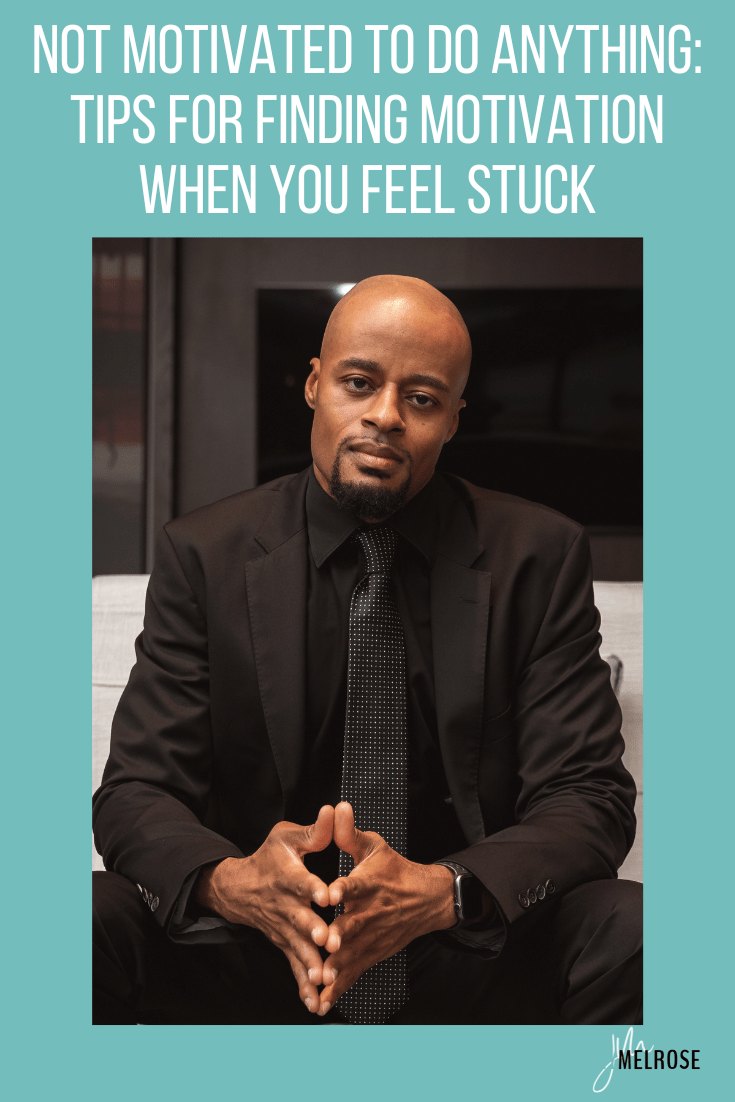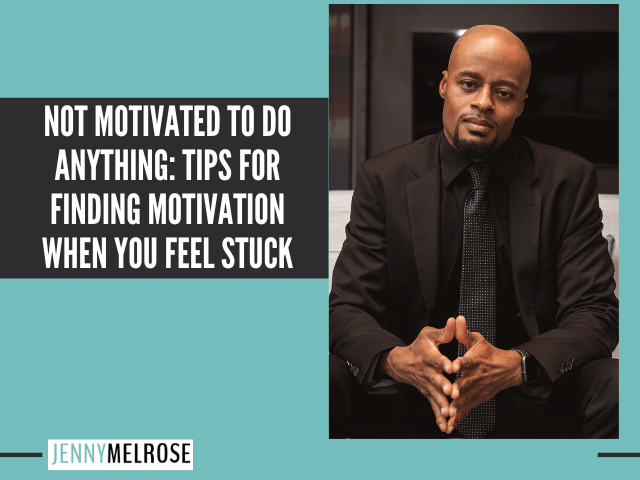Discover practical tips to reignite your motivation when you feel stuck and uninspired.
IE 375: Not Motivated to Do Anything: Tips for Finding Motivation when You Feel Stuck

We all have occasions when we are not motivated to do anything and feel stuck. In this episode, Dre Baldwin talks about motivations and discipline to keep moving forward in your business through the use of structure.
Dre “All Day” Baldwin was a 9-year pro athlete who has written 33 books, including The Mirror of Motivation, and given four TED Talks. Originally from Philadelphia, he now lives in Miami.
His online career started when he began giving sports advice on YouTube and evolved when other athletes started asking him about his consistency in putting out content.
He would talk about discipline, showing up every day, having the confidence to put yourself and your work into the world, mental toughness, and personal initiative (getting started).
When he started talking about mindset things, people who did not play sports started trickling into his audience. While it applied to the ball players, it applied to everyone.
That planted a seed for him to know what he needed to leverage to segway from the sports world to his “after sports” life. When he stopped playing ball in 2015, he took the pieces he was talking about then and turned them into a full-time career.
As an athlete, you have discipline in your head, know what it means, and you are used to putting the actions in. If you have not had that background, it can be hard to turn it around and apply it to business,
What are often the underlying reasons why people feel a lack of motivation?
The number one reason people lack motivation is that motivation is not what you need when performing at the professional level.
When someone gives you the reason that they are lacking the motivation to complete a task, do something, or get started on something, it is because motivation comes and goes. Motivation is something for 8th graders or middle schoolers.
A professional needs discipline. Discipline is what makes you show up every day, even when you don’t feel like showing up. If you “don’t feel like it,” that means you don’t have the motivation.
As a professional, you cannot just quit doing your job when you don’t feel like it. The only way you will continue to get paid is if you continually show up and do your job.
If you have a job and you have a boss, if you don’t feel like coming to work one day, you cannot just not go to work or you won’t have a job the next day.
If you are an entrepreneur, have clients giving you money and expecting something, and you don’t feel like doing something that day, you can’t just not do it. They are going to ask for their money back.
You need something stronger than motivation. Many professionals go looking for motivation or believe they cannot do something because they don’t have motivation.
Dre says this is an inaccurate formula. You are operating off a formula that doesn’t work. Even if you get the answer right, you are still in the wrong place.
What is discipline?
Discipline is showing up every day to do the job or whatever the work happens to be.
Most people understand that conceptually. If you ask them if there is an area of their life where they need more discipline, almost everybody says yes. Most people have more than one.
The challenge is that most people try to force discipline upon themselves. This is another inaccurate formula that doesn’t work.
Most people want more discipline and think they need to be more disciplined, more consistent, and find the motivation to be more disciplined. You are asking the wrong question.
Discipline comes from structure. When you have structure in place, discipline is an automatic by-product of structure just the same as water on the ground is a by-product of a rain shower. It naturally happens. You have to put the structure in place.
Anyone who has played a team sport at the collegiate or pro level knows that there is a lot of structure put in place by the coaches. They dictate how it works, what time you have practice, what you need to bring to practice, what time you need to be on the court, how you show up to the game, how you run plays, how you are expected to answer to the coaches call (run not walk), and what the structure is.
If you have strict parents, they told you what the structure was; when you did your chores, how much time you did your homework, and the penalties for not doing chores or homework.
Anyone who has been in the military, had a demanding boss, or a personal trainer knows about the structure that is put in place. Everywhere in life where people are disciplined, it is usually because there is a solid structure that is put in place.
The biggest challenge Dre has found with entrepreneurs is that because they are the boss, they don’t put structure on themselves. Without the structure, their discipline starts to fall apart. Routine is a form of structure.
What structure can entrepreneurs put in place?
Most entrepreneurs have had at least one job before starting their own business. What was the structure of that business of the last job they had before they became an entrepreneur (if there is one)?
Dre uses McDonald’s, where he worked as a senior in high school, as an example. McDonalds is extremely structured, which is why they are the biggest restaurant in the world. They have such a tight system that anyone can work for them to create burgers that all taste the same.
When someone orders a burger, there is a structure to get the burger made. There is a structure for how to wear your uniform, what time you come to work, what time you leave, and how to clock in and out.
There is a structure for everything in McDonald’s so you don’t need any skill to operate the business, except for possibly the manager. Everyone follows the structure and system.
This works the same way for an entrepreneur. Look at your day, the things you need to get done, and reverse engineer each item.
For example, if you want to write 500 words and that takes you an hour, you will need to find an hour on your calendar to write those 500 words and then write it on the calendar.
When you are at work and have certain things that need to be done every day as required by your boss. You have to determine how you are going to get those things done.
Usually, your work environment will offer you some structure to determine how you will get those things done. It may be demanding but not impossible.
As an entrepreneur, you have to determine how to put that same structure in place as when you are working under a boss who has given you the structure to get things done. You have to hold yourself to the same standards.
The biggest challenge for entrepreneurs is that they are terrible bosses and if you want to be an entrepreneur, you have to be the boss.
Malcolm X said in his autobiography. “Every organization must have a boss.” Even if you are the only person in your organization, you have to be the boss of yourself.
Is there a way to prioritize those tasks that you have to get done as an entrepreneur to create a daily system?
To prioritize your tasks, lay them all out on the table and decide which ones have the highest impact on your business. Usually, for entrepreneurs, that is something related to making money.
Which ones are the most important? Perhaps your marketing plan will bring you people to sell your stuff.
A little hack that might help is that usually, the task with the highest impact is the hardest one to do. It may be a task that you look forward to the least and will require the most time and most brain power to do it.
Entrepreneurs tend to do a bunch of little things that make us feel productive but those things do not make us effective.
Productive means you have produced something. You can check boxes off of your to-do list and be productive.
If you are being effective, you are doing something that influences the bottom line of your organization.
Typically, it is only one to three really effective things. You can be productive with a 60-item to-do list that makes you feel tired at the end of the day but did you move yourself forward?
Deciding the most important things that need to get done is another discipline. Russell Brunson calls this the “big domino” and asks, “What is the one thing I need to get done that will render all of the other things irrelevant?” What are the priorities?
Dre’s “big domino” was when he began his business to figure out a way that he could generate money through basketball while keeping it under his control (and not under a professional contract). He had to figure out how to get people to give him money for the things that he created.
He began selling directly through YouTube before they changed their rules.
He consistently put free content on YouTube for five years before he put anything for sale. He built his “know, like, trust” relationship with his audience, and then when he began selling, people bought immediately.
He created content and then redirected that audience to his website where he sold other resources.
Content creation is part of your marketing plan. Bloggers cannot depend on ad revenue because that can easily go up or down depending on algorithms, changes with Google, and other factors. Think about what products or services you can create for your space to create revenue and drive your business forward.
Marketing is the relationship you have with your audience. It is finding the people who you want to serve and who want to be served by you. It is building, nurturing, and continuing that relationship.
Marketing is not just for people who have never heard of you before. You still need to market it to people who gave you money six months ago because there is no guarantee they are going to give you money again. You have to keep marketing to people once they are in your world.
Marketing is a never-ending thing. Every email you send is marketing. Handling customer service complaints is marketing.
When people send you a text message or follow you on social media, it is marketing. Every possible thing that you put into the world that people can consume and then make a decision to give you money or not is marketing. Every part of the relationship is marketing.
What is one action we can take today to gain momentum and move forward in creating structure?
Pull out your calendar and fill it up with everything that needs to be done. You can put them into time slots and then realize that you have more things on your to-do list than you have time.
This is when you need to prioritize what things you actually need to do and what really matters versus what doesn’t matter.
If you notice that something continually gets pushed back on your list day after day, it may not be that important. If it has been three weeks that you haven’t gotten it done and the world hasn’t fallen then maybe you don’t need to do it at all.
Dre uses an online calendar while Jenny uses a paper calendar. Either way works as long as you are using it.
Dre Dawson’s newest book, The Third Day.
The third day says that everyone is excited at the beginning and putting their best face forward. The second day, it is a little less. By the third day, the realization hits that this thing you are doing is going to be work and take effort. It isn’t as easy as it looks.
You have to do something to make it work. The third day happens to everyone and you have to decide. Are you going to keep showing up and delivering even when you don’t feel like it?
This is what separates the pros from the amateurs. Or are you going to stop showing up?
The book is to help you put the processes and systems into place to help you show up even when you don’t feel like showing up.
ACTION ITEMS
- If you liked this episode of Influencer Entrepreneurs, please subscribe and leave a fabulous review!
- Ready to go deeper into your business? Join the Insiders Group at the special rate for podcast listeners.


